
Platysteiridae is a family of small, stout passerine birds of the African tropics. The family contains the wattle-eyes, batises and shrike-flycatchers. They were previously classed as a subfamily of the Old World flycatchers, Muscicapidae. These insect-eating birds are usually found in open forests or bush. They hunt by flycatching, or by taking prey from the ground like a shrike. The nest is a small, neat cup, placed low in a tree or bush.

The green pheasant, also known as the Japanese green pheasant, is an omnivorous bird native to the Japanese archipelago, to which it is endemic. Some taxonomic authorities consider it a subspecies of the common pheasant, Phasianus colchicus. It is the national bird of Japan.
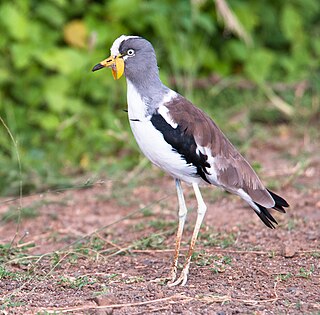
The white-crowned lapwing, white-headed lapwing, white-headed plover or white-crowned plover is a medium-sized wader. It is resident throughout tropical Africa, usually near large rivers.
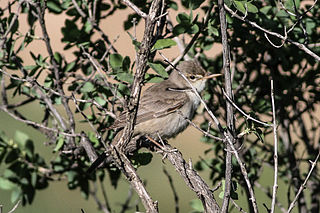
Upcher's warbler is an Old World warbler in the tree warbler genus Hippolais. It breeds in an area from Turkey south and east to Pakistan. It is migratory, wintering in eastern Africa, from Eritrea and Somalia south to Tanzania.

The blood pheasant or blood partridge is the only species in genus Ithaginis of the pheasant family. It is a relatively small, short-tailed pheasant that is widespread and is fairly common in eastern Himalayas, ranging across India, Nepal, Bhutan, China, and northern Myanmar. Since the trend of the population appears to be slowly decreasing, the species has been evaluated as of least concern on the IUCN Red List in 2009.

The African paradise flycatcher is a medium-sized passerine bird. The two central tail feathers of the male are extended into streamers that commonly are more than twice as long as the body. The female tail feathers are of moderate length and without streamers. The upper parts of the male body, wings, and tail are boldly coloured in chestnut or rusty shades, but the underparts and the head are variably grey to blue-gray, with the head of the mature male being darker, commonly glossy black with greenish highlights. The beak and other bare areas, including a wattle ring round the eye, match the colour of the surrounding feathers. The female coloration is similar, though not so showy and glossy and with the head paler.
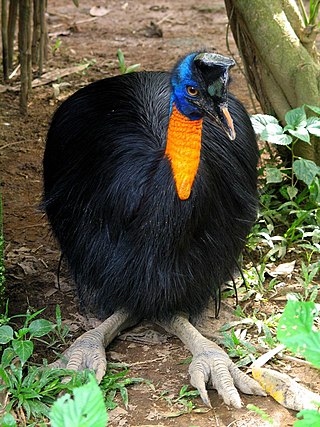
The northern cassowary also known as the one-wattled cassowary, single-wattled cassowary, or golden-necked cassowary, is a large, stocky flightless bird of northern New Guinea. It is one of the three living species of cassowary, alongside the dwarf cassowary and the southern cassowary. It is a member of the superorder Paleognathae.

The long-tailed silky-flycatcher is a passerine bird which occurs only in the mountains of Costa Rica and western Panama, usually from 1,850 m altitude to the timberline. It is a thrush-sized species weighing about 37 g. The silky-flycatchers are related to waxwings, and like that group have soft silky plumage.

The long-tailed paradigalla is a large, approximately 37 cm long, black bird-of-paradise with long and pointed tail. One of the most plain members in the family Paradisaeidae, its only adornment is the colorful facial wattles of yellow, red and sky-blue near base of the bill. Both sexes are similar in appearance, however the female is slightly duller and smaller.

The genus Paradigalla consists of two species of birds-of-paradise. Both are medium-sized black birds with blue and yellow facial wattles.
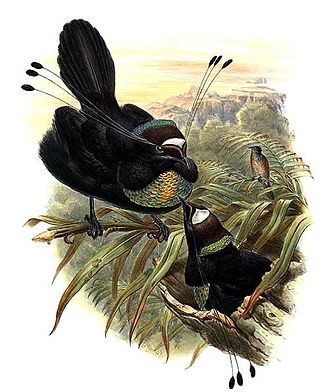
The western or Arfak parotia is a medium-sized, approximately 33 cm long, bird-of-paradise with a medium-length tail.

Stephanie's astrapia, also known as Princess Stephanie's astrapia, is a species of bird-of-paradise of the family Paradisaeidae, native to the Bird's Tail Peninsula. This species was first described by Carl Hunstein in 1884.

The pririt batis also known as the pririt puff-back flycatcher or pririt puffback, is a small passerine bird in the wattle-eye family. It is resident in Southern Africa and southwestern Angola.

The wattled guan is a species of bird in the family Cracidae. It is a fairly large black cracid with blue-based, black-tipped beak and a long, red-and-yellow wattle.

The wattled starling is a nomadic resident bird in eastern and southern Africa. It is a species of grassland, open woodland, and cultivation.

The long-tailed starling is a species of starling in the family Sturnidae. It is endemic to the Schouten Islands off West Papua, in Indonesia, an important area of bird endemism. The species was once treated as part of a superspecies with the shining starling. There are two subspecies, the nominate race, which occurs on Biak, and brevicauda, which is found on Numfor Island. It occurs in a wide range of habitats at all altitudes, including natural forest and forest edges, as well as human modified secondary forests and gardens. In spite of its tiny global range the species is not considered threatened by human activities and remains common within its range, and is therefore listed as least concern by the IUCN.
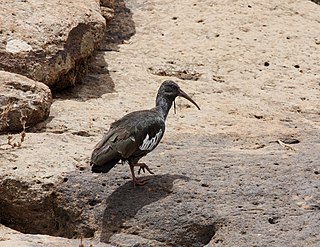
The wattled ibis is a species of bird in the family Threskiornithidae. It is endemic to the Ethiopian highlands and is found only in Ethiopia and Eritrea.

The Visayan broadbill is a species of bird in the family Eurylaimidae where it was previously conspecific with the wattled broadbill. It is endemic to the islands of Samar, Leyte and Bohol in the central Philippines. Its natural habitat is tropical moist lowland forests. It is threatened by habitat loss.
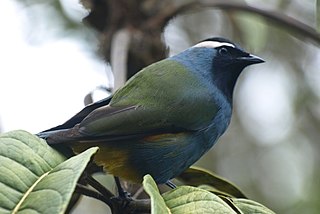
The eastern crested berrypecker is a species of bird in the family Paramythiidae. It is commonly found in the high montane forests and shrublands of New Guinea. There are two subspecies, Paramythia montium montium and Paramythia montium brevicauda. The former inhabits the eastern portion of the New Guinea Highlands while the latter can be found in the Huon Peninsula. The western crested berrypecker was formerly considered conspecific but was split from it in 2021.





















